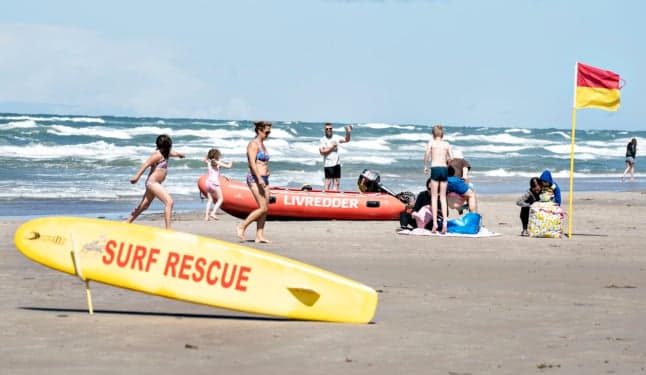Why you need to be careful at Denmark's beaches this summer

July has seen a dramatic uptick in rescue operations of beachgoers trapped in rip currents. Here's how to safely have fun in the summer sun at Denmark's beaches.
During the third weekend in July alone, lifeguards up and down the North Zealand coast tallied 31 rescue operations from strong currents and revlehuller Danish public television network DR reports.
Revlehuller which translates roughly to "reef holes" in English and are a form of rip current, are a perennial peril to Danish bathers and necessitate 40-80 rescues during a summer bathing season along the North Zealand coast, DR said. That's why recent rescue numbers are striking.
According to TrygFonden, a Danish non-profit that promotes water safety, a reef hole is a "depression in the reefs of the beach, where there can be an outward current that leads the water back out into the sea."
READ MORE: These are Denmark's 13 new perfect swim spots
Revlehuller move and aren't always active – they require particular wind and wave conditions to pose any risk to bathers, and a location that is safe to swim one day may be dangerous the next.
Experts advise bathers to avoid areas where natural rock formations and human-made stone breakers run along the coastline. These are frequent sites for revlehuller.
According to tourism website VisitNordsjælland, twenty-four beaches in North Zealand have lifeguards. Not only will someone be able to come to your aid, lifeguards in Denmark also plant two flags by the water's edge in places that are guaranteed revlehuller free.
If you find yourself caught in a revlehuller, resist the instinct to swim directly toward the shore. Swim parallel to the shore to make it to calmer waters, or call out to a lifeguard and tread water until help arrives.
Comments
See Also
During the third weekend in July alone, lifeguards up and down the North Zealand coast tallied 31 rescue operations from strong currents and revlehuller Danish public television network DR reports.
Revlehuller which translates roughly to "reef holes" in English and are a form of rip current, are a perennial peril to Danish bathers and necessitate 40-80 rescues during a summer bathing season along the North Zealand coast, DR said. That's why recent rescue numbers are striking.
According to TrygFonden, a Danish non-profit that promotes water safety, a reef hole is a "depression in the reefs of the beach, where there can be an outward current that leads the water back out into the sea."
READ MORE: These are Denmark's 13 new perfect swim spots
Revlehuller move and aren't always active – they require particular wind and wave conditions to pose any risk to bathers, and a location that is safe to swim one day may be dangerous the next.
Experts advise bathers to avoid areas where natural rock formations and human-made stone breakers run along the coastline. These are frequent sites for revlehuller.
According to tourism website VisitNordsjælland, twenty-four beaches in North Zealand have lifeguards. Not only will someone be able to come to your aid, lifeguards in Denmark also plant two flags by the water's edge in places that are guaranteed revlehuller free.
If you find yourself caught in a revlehuller, resist the instinct to swim directly toward the shore. Swim parallel to the shore to make it to calmer waters, or call out to a lifeguard and tread water until help arrives.
Join the conversation in our comments section below. Share your own views and experience and if you have a question or suggestion for our journalists then email us at [email protected].
Please keep comments civil, constructive and on topic – and make sure to read our terms of use before getting involved.
Please log in here to leave a comment.